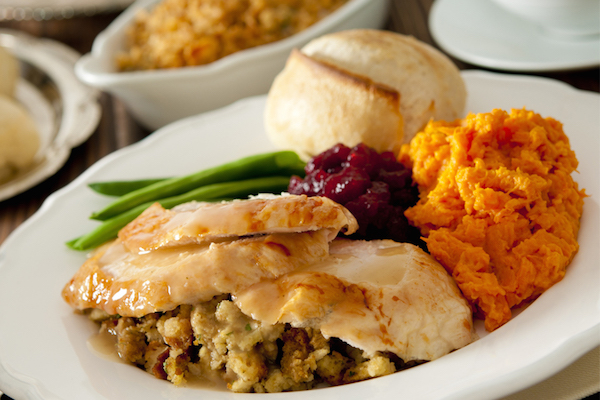On Thanksgiving Day, overindulgence is often part of the holiday ritual, and is usually accompanied by a side of indigestion or heartburn. Too much turkey and stuffing may be responsible for the discomfort, but there are several measures you can take to help your body properly digest your Thanksgiving feast.
Dr. Ira Mayer, Director of Gastroenterology at Maimonides, offers some recommendations for what you can do before, during and after your holiday meal, to help aid digestion.
Before Thanksgiving Dinner
Don’t skip earlier meals to “save room” for hors d’oeuvres and dinner – eat a sensible breakfast and lunch so that you are not starving at dinner time. “A hungry body overloaded with appetizers won’t properly metabolize food,” explains Dr. Mayer.
It’s important to maintain your regular physical activity level on Thanksgiving. Whether you break a sweat at the gym before company arrives or take a walk after your meal, keeping your metabolic rate up through exercising, aids digestion. This allows the body to retrieve nutrients from what you consume, rather than converting all those calories into fat.
During Thanksgiving Dinner
Turkey is among the healthiest forms of lean protein. Reach for the lighter pieces of meat – they have fewer calories and less fat than the darker pieces. Many gravies, sauces and side dishes can make the meal far less healthy. Since most Thanksgiving dinners include starchy foods like potatoes, biscuits and stuffing, Dr. Mayer recommends eating those holiday staples in moderation.
“Rather than eating one large portion of food that can lead to bloating and discomfort, stick to eating smaller portions slowly or use a smaller plate to avoid overeating,” advises Dr. Mayer. As you build your dinner plate, first fill it with lean meat and vegetables. Vegetables high in fiber, like broccoli, green beans and carrots, can aid the digestive process. Lastly, you can add a small taste of your holiday favorites.
“Pace yourself and chew your food well,” says Dr. Mayer. “If you eat slowly, you will be less likely to overindulge and cause yourself discomfort.”
Use the break between dinner and dessert to stretch your legs. A brief stroll can keep you from experiencing a “food coma,” or a sluggish, drowsy feeling. Dr. Mayer points out that taking a walk after dinner will also increase your metabolic rate, and aid in your digestion.
“When dessert is served, it’s best to take the same approach used building your dinner plate – moderation,” advises Dr. Mayer. “It’s difficult to resist our favorite sweets, but you can limit yourself to sampling a selection or two, rather than having full servings. This way, you can enjoy yourself at the table and still enjoy a good night’s sleep when you get home, without the indigestion.”
Alcohol consumption can also contribute to digestive issues. Keep your drink selection to something simple and light, or avoid alcohol all together. This will ensure that you enjoy the taste of your food and have fewer issues with digestion.
After Thanksgiving Dinner
Dr. Mayer recommends you stay awake until your regular bedtime – do NOT sleep or take a nap immediately following a big meal. Stay awake for at least two or three hours after you finish eating – enjoy conversation with loved ones, play games, walk or simply read a book so that your body can continue to digest. Lying horizontally before your body has digested food can cause acid reflux because gravity is unable to guide food down the digestive tract.
“If you find yourself experiencing indigestion, despite your best efforts to avoid it, there are numerous over-the-counter medications available to assist you,” explains Dr. Mayer. “Antacids come in liquid and tablet form, and most will give you some relief.”
If you have a history of hypertension or heart problems, you should avoid excessive salt consumption. The guidelines above apply to people in general good health. If you have a history of gastrointestinal difficulties, you may need to consult your physician before participating in holiday festivities.
To learn more about the Division of Gastroenterology at Maimonides, visit https://www.maimonidesmed.org/clinical-services/gastroenterology/gastroenterology2. To make an appointment with Dr. Ira Mayer, Director of Gastroenterology, please call 718-891-0100.
Maimonides Medical Center is nationally recognized for clinical excellence across all major specialties. Our accomplished physicians are known for innovation and strengthening our teaching and research programs. With 711 beds, the Medical Center is dedicated to bringing patients the most advanced care available—anywhere. Maimonides continues to grow in response to evolving models of care that better serve patients and families, and is an affiliate of Northwell Health. To learn more, please visit www.maimonidesmed.org.










